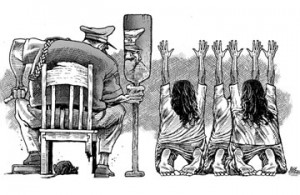
According to a Cebu Daily News report, the seven female trainees are part of the 12 who all complained about the hazing done by their instructors which include slapping their bare feet with sticks.
We don’t know what other kind of physical abuse were done on the trainees, though at the very least one is thankful that it didn’t involve sexual abuse which even in their controlled environment may happen to them.
That the police trainees were undergoing counter-insurgency training makes the whole incident all the more disturbing. Should this hazing practice be allowed to continue, what’s to stop future trainees from enforcing this brand of discipline on suspected rebels or rebel trainees in case they move up the ranks?
Under this abusive environment, police training officers who enforce hazing and the trainees exposed to it continue to feed this cycle of violence once they do pass their requirements and were assigned to their respective beats.
Hazing as a practice is most often found in fraternities like those that Marcos sought to get accepted to as well as military training camps who accept it as part of life inside the barracks.
For the trainees who do pass this unofficial phase in their training, very few will speak out against it, if at all, since the trainers or instructors wield considerable influence within the police or military hierarchy.
The seven female police trainees have as much to lose as their male counterparts in filing the complaint in a court which is also anchored on the apparent neglect of their training director in supervising and monitoring their instructors.
As if the police doesn’t have any problems of their own dealing with inadequate firearms, vehicles and lack of logistical support. Mandated with serving and protecting the people, the police can’t even protect their own from the abuse committed by higher-ups in their organization.
If anything, training director Insp. Juanito Nuñez and training manager and Senior Insp. Dexter Calacar share the blame with the instructors who actually committed the abuse, since it happened under their watch, which they were too busy to do for reasons known only to them.
We can only hope that the trainees encourage others to follow suit and file a complaint if only to stem and outrightly eliminate hazing as part of their police training, unofficial and hidden though it may be.